Pedalling toward possibility: How bikes are breaking education barriers for girls in rural areas
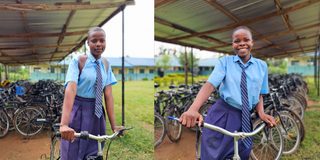
Bridgette Akoth (left) and Maureen Omina in this photos taken on on June 20, 2025. Both are students at Musango Mixed Secondary School in Mumias East, Kakamega County. Before they got the bicycles, the daily one-hour trek to school left them drained physically and mentally.
What you need to know:
- Rural girls who once walked over an hour through mud to school now cycle there in half the time, arriving early and ready to learn.
- The bicycles have increased school attendance by 28 per cent and reduced dropout rates by 19 per cent.
- Students like Maureen have seen their grades jump from D+ to C+ after receiving wheels instead of walking.
At just 18 years old, Maureen Omina has already mastered the art of fighting for her education. Every morning at 4am, this Form Four student at Musango Mixed Secondary School in Mumias East, Kakamega County, begins a routine that would exhaust most adults.
But unlike two years ago, when that pre-dawn wake-up call meant bracing for an hour-long trudge through treacherous terrain, Maureen now spends those precious morning hours with her books.
"The roads are terrible," she recalls, shaking her head at the memory.
"When it rains, they turn into thick mud. I'd sometimes arrive late, my shoes caked in dirt, completely exhausted. Once you're that drained, it's hard to concentrate—your body is in class, but your mind is still stuck somewhere along that muddy road."
For years, Maureen's home in Musango village felt like it existed in a different world from her school, separated by several kilometres of rutted, unforgiving paths. Each school day began as a test of endurance rather than intellect, with the 4am alarm serving not as study time, but as preparation for the long, punishing journey ahead.
Everything changed in the third term of Form Two when Maureen received a Buffalo bicycle—a moment that transformed not just her commute, but her entire academic trajectory.
"Now I wake up at 4am and study until 5:40am," she explains, pride evident in her voice. "Then I get ready and leave home by 6:20am. Cycling to school takes less than an hour, and I arrive on time, refreshed, focused, and ready to learn."
The transformation was immediate and dramatic. Maureen's grades climbed from a struggling D+ in the first term of 2023 to a solid C+ by the first term of 2024—a leap that speaks to more than improved transportation.
"It's because I finally had time to revise, attend morning preparations, and be part of every lesson from the start," she says, her voice steady with newfound confidence.
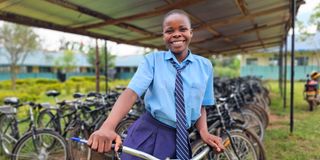
Maureen Omina, a Form Four student at Musango Mixed Secondary School in Mumia East, Kakamega County. The road to education felt like a battle until she received a bicycle in 2023.
Yet even with a bicycle, Maureen's journey remains challenging. The road from her home winds uphill, its surface broken by erosion and slick with thick, clinging mud. On rainy mornings, the steep climb becomes a struggle that forces her to dismount and push the heavy bike through the sludge, her shoes slipping, her uniform speckled with soil.
"Sometimes, riding simply isn't an option," she explains. "You just grip the handlebars and push, one muddy step at a time, all the way to school."
Nineteen-year-old Bridgette Akoth, from a different part of Musango village, intimately understands this struggle. Before receiving her bicycle, the daily hour-long walk left her physically exhausted and mentally worn down, often arriving late and missing critical morning preparation sessions.
"I was missing those important morning preps," she says quietly. "By the time I arrived, the teacher was already in class."
Bridgette's turning point came in the final term of Form Two in 2023, when she received her bicycle. Drawing on riding skills her father had patiently taught her, she quickly adapted to her new mode of transport.
"I started getting to school early, by 6:10am," she reflects. "I'd settle in, open my books, and study before the first lesson even started."
The academic turnaround was nothing short of dramatic. Bridgette's grades surged from a consistent C to a B-, propelling her to fourth place in her class—a leap that filled her with renewed confidence and purpose.
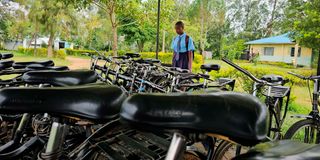
Bridgette Akoth in this photo taken on taken on June 20, 2025. Before she got her bicycle, she often arrived late to school.
Bridgette and Maureen are among 40,000 school-going beneficiaries of Buffalo bicycles—sturdy, purpose-built bikes designed to endure rough terrain, carry heavy loads, and require minimal maintenance. These bicycles, donated by World Bicycle Relief, are transforming not just individual journeys, but entire learning experiences across rural Kenya.
According to Maureen Kolenyo, regional director for East Africa at World Bicycle Relief, the Buffalo bicycle represents an engineered mobility solution specifically designed to withstand Africa's toughest terrains.
"It's in its 12th generation of design," she explains. "It has a strong frame, durable tires, and a carrier that can bear household loads. With proper maintenance, it lasts up to 15 years."
The bicycles are distributed through a combination of donation and purchase models. Vulnerable groups such as school-going children and community health workers often receive them as donations, while women entrepreneurs and other users can purchase them through social enterprise mechanisms, including hire-purchase options.
Deliberately focusing on girls
What distinguishes the organisation's approach is its deliberate focus on girls. Of the bicycles distributed to students, 70 per cent go to girls, while 30 per cent are allocated to boys — a strategic decision informed by the disproportionate burden girls in rural areas face when accessing education.
"In rural Africa, girls carry the heavier burden," Maureen points out, concern evident in her voice. "They wake up earlier to finish chores, walk longer distances to school, face stigma during their periods, and constantly worry about their safety. They're the ones too often left behind."
The results of this targeted intervention are visible in concrete data. In program areas including Siaya, Kakamega, Kisumu, Busia, Bungoma, Nakuru, Kitui, Kwale, Kilifi, and the newly added Kajiado County, schools have recorded a 28 per cent increase in attendance among students who received bicycles. Dropout rates, particularly among girls vulnerable to early pregnancy, have decreased by 19 per cent.
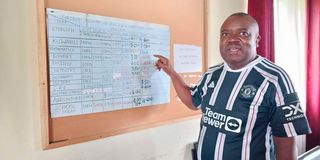
Michael Musambai, the Senior Principal at Musango Mixed Secondary School says bicycles have increased students’ contact hours, with many now arriving by 7am for morning remedial lessons.
Education officials can attest to the bicycles' transformative impact on student performance. Michael Musambai, Senior Principal at Musango Mixed Secondary School, is unequivocal about the change he's witnessed.
"The students have been able to come to school early, and we've been able to retain them because of these bicycles," Musambai explains. "We've always struggled with transport and distance. These bicycles are truly making a difference."
The bicycles have increased students' contact hours, with many now arriving by 7am for morning remedial lessons and leaving at 5pm—early enough to reach home before dark.
Timely arrival and early return home, especially for girls, plays a crucial role in reducing exposure to risks like harassment and insecurity, the principal notes.
"By getting home early, we're able to protect these children, especially the girls, from the dangers they might encounter on the way," he emphasises.
However, Musambai advocates for balanced distribution in future programs: "As much as we've rightly focused on the girl child, we must now balance equity and equality in future distributions."
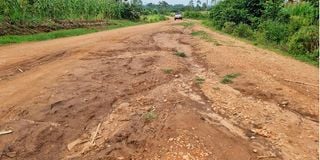
A stretch of road in Musango village, where rainfall turns the path into a slippery mess, making it challenging for girls to cycle to school.
He acknowledges that while the bicycle program has helped reduce dropouts, the problem remains multifaceted.
"For girls, dropping out is often because of pregnancy. For boys, it's more about truancy—some leave to join the motorcycle taxi business, others fall into drug abuse," he explains. "There's also poverty. Even though there's free day secondary education, some activities still require parental support, which many families can't afford."
The school principal also notes that poor road conditions continue to hinder the bicycles' effectiveness.
"The terrain is not just about geography; it's about access," he says. "When the roads are bad, even a bicycle can't help. That's something that needs investment from beyond the school."
Despite these challenges, the school is witnessing meaningful progress and maintaining hope for greater change.
"If we had more bicycles and could reach more students, the impact would be even greater," he concludes.
Mbugua Kabaki, the Ministry of Education's county director of education for Siaya County, views the bicycle provision as fundamental to achieving inclusive and equitable education.
"At the Ministry of Education, we view access as a fundamental pillar to achieving inclusive and equitable education; it is what brings learning closer to the learner," he states.
"When the child cannot reach the school, it becomes impossible for that child to access learning. Any aspect that facilitates the child's access to school is a driver toward achieving universal basic education."
In Siaya County, long distances to school and household poverty remain significant barriers to learning. For many girls, trekking several kilometres daily exposes them to numerous risks, including fatigue, sexual harassment, early pregnancy, and ultimately, dropping out.
"The bicycles we receive — 70 per cent are designated for the girl child and 30 per cent for the boy child," explains the education official.
"This means that for every three bicycles, two are for girls. This preference is intentional because of the many factors that affect the girl child negatively. When a girl has a bicycle and can easily reach school, the risks are significantly reduced."
Beyond safety, the bicycles have noticeably improved girls' morale and self-esteem. According to Kabaki, when girls walked to school, they often arrived muddy, tired, and discouraged. With bicycles, however, they now arrive clean and energised—a shift that has boosted their confidence and eagerness to learn.
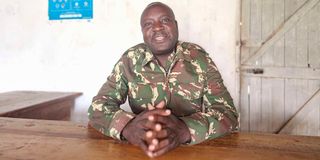
Benson Ochango, the Senior Assistant Chief of Maraba Sub-location and acting chief of Makunga in Mumias East Sub-county in this photo taken on June 20, 2025. He says access to mobility has given girls power, literal and symbolic, to resist exploitative relationships and pursue education with dignity.
This intervention does more than help girls arrive at school on time; it's transforming lives by tackling deep-rooted cultural and socio-economic challenges, particularly teenage pregnancy.
Local administrator Benson Ochango, senior assistant chief of Maraba Sub-location and acting chief of Makunga in Mumias East Sub-county, has witnessed the difference first-hand.
"Before the bicycles came in, we used to handle several cases of teenage pregnancy, and most were linked to motorcycle taxi riders," the local administrator reveals. "I remember one year we even jailed three riders for impregnating schoolgirls. But today, those cases have dropped to almost zero."
According to Ochango, access to mobility has given girls both literal and symbolic power to resist exploitative relationships and pursue education with dignity.
"Poverty is the main issue here," he explains. "It leads to inconsistency in school attendance. In families with both a boy and a girl, the boy is usually prioritised for school. Girls are often left behind, and when they lack basic needs like food, sanitary towels, or fare to school, they become vulnerable."
He describes how some girls were lured into sexual relationships with motorcycle taxi riders who offered free transport in exchange for favours—relationships that often led to early pregnancies, dropouts, and shattered futures.
But with the bicycles, this script is changing.
"Now, these girls don't need to depend on motorcycle taxis. They have their bicycles. They arrive at school early, return home before dark, and are safe. Their learning has improved and so has their confidence," he says.
Ochango estimates that bicycles have helped eliminate about 65 per cent of the barriers that previously hindered girls' access to education in the region.
"Economically, the impact is huge too," he adds. "Before, parents were spending money on transport. Now, that same money goes toward food or school essentials. Bicycles have reduced household pressure."
Cultural stigma has long prevented many girls from reporting abuse or returning to school after giving birth. However, with communities now recognizing the value of keeping girls in school, and with reduced exposure to high-risk situations, the cycle of shame and silence is beginning to break.
"Girls used to keep quiet even after being defiled. They'd only come forward when there was no evidence left," Ochango explains. "And many didn't believe it was possible to return to school after having a child. But that's changing now, slowly."
Symbol of freedom and possibility
For many like Maureen and Bridgette, a simple bicycle has become a powerful symbol of freedom, safety, and possibility.
"We feel safer on the road, and we have time and energy to study in the evenings," says Bridgette, who dreams of becoming a journalist. "It's not just a bike; it's our path to a better future."
Maureen, who aspires to be a nurse, nods in agreement, embodying the transformation that occurs when barriers to education are dismantled, one pedal stroke at a time.
In rural Kenya, where poor roads and long distances have long threatened girls' education, these bicycles are doing more than easing the journey to school—they're paving the way to new possibilities, one determined girl at a time.


